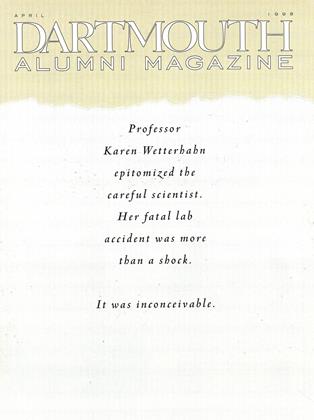Three thousand newsmen and women the number estimated to have accompanied Pope John Paul IT on his visit to Cuba have by now learned what freelance journalist Christopher Hunt '85 has known for some time. Fascinated by Castro's public personality, Hunt determined last year to trace the dictator's career from his landing in a swamp with 81 fellow rebels to his defeat of Batista's 46,000-man army and resolved to meet him in person as well. In a book called Waiting for Fidel (Houghton Mifflin), Hunt describes the island's economy: rotting cars in the streets, food in the bodegas available only during certain weeks, old people just a few steps from utter misery-, bars without glasses, transportation at the whim of the bus or taxi driver. Hunt found no reluctance to talk, either for or against the regime, and was amazed at the acceptance of Castro's socialism free schools, free hospitals, controlled rents. But did he ever see Castro? Perhaps those three black Mercedes that just sped around the corner....
David K. Shipler '64's remarkably thorough, nationwide study, A Country of Strangers: Blacks and Whites in America (Knopf), focuses on the distances that still have to be made up in our country's race relations: the forgetful unfeeling of even the most race-conscious and caring whites; the understandable supersensitivity of many blacks in response to put-downs, real or fancied. There is hardly an interracial situation that Shipler, a Ptilitzer Prize-winning journalist, has not been able to examine in detail: boss/employee or job candidate, officer/enlisted man, teacher/student, parent/child. His final chapter, "Choices," examines some of the solutions that have been proposed to lighten the troubled relationships that still exist. (Though immensely readable, this is a big book. If your reading time is limited, the chapter on affirmative action is recommended.)
Don't believe what other admissions officers claim that grades are more important than SAT scores. So says Michele A. Hernandez '89, who worked in Dartmouth's admissions office for four years and wrote about it in A is for Admission: The Insider's Guide to Getting into the Ivy League and Other Top Colleges (Warner Books). She lets readers in on the secret formula for the "academic index" that Dartmouth and other highly selective colleges use to quantify applicants' accomplishments: a formula that rolls SAT scores and class rank into an all-important number. She also notes the various tip factors that make admission for some candidates more likely than for others. Most usefully, she tells students how to present themselves in the strongest light. The book has drawn its share of criticism on campus. "I think the book is unfortunate because it fails to convey the depth of thought and care that goes into selecting students for Dartmouth," says admissions dean Karl Furstenberg. "To th e extent that the book oversimplifies the process, it is a disservice to prospective students."
 View Full Issue
View Full Issue
More From This Issue
-
 Cover Story
Cover StoryThe Trembling Edge Of Science
April 1998 By Karen Endicott -
 Feature
FeatureSpiked Boots and the End of an Era
April 1998 By Edie Clark -
 Feature
FeatureA Change in the Weather
April 1998 -
 Feature
FeatureThe STREAMLINER DINER
April 1998 By Jane Hodges '92 -
 Article
ArticleThe Benefits of a College Town
April 1998 By Jeanhee Kim '90 -
 Class Notes
Class Notes1985
April 1998 By John MacManus







